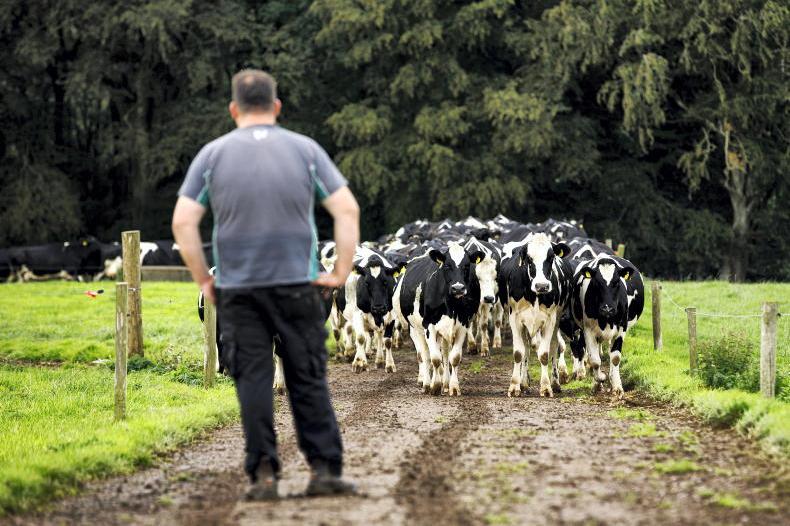The Complementary Income Support for Young Farmers (CIS-YF) is proving popular with young farmers, with payment rates rising by almost 150% compared to the previous CAP. A young trained farmer eligible for a maximum payment on 50ha is eligible to receive a payment ranging from over €7,500 to €8,450.
The payment rate is set at approximately €155/ha on average with a top-up bringing the payment to almost €170/ha in 2024. Reports indicate that the greatest contributor to young farmers experiencing issues and receiving penalties in the case of inspections is not being in a position to display full control of the business.
Inspection process
Applicants under the CIS-YF are subject to administrative checks. In addition, the terms and conditions state that at least 5% of applicants will be selected for an on-the-spot inspection to ensure compliance with the rules of the scheme. Documentary evidence to verify that the ‘young farmer’ is solely or jointly in control of the holding will be sought as part of the inspection process.
The inspection process is divided in to two main parts – a land eligibility inspection and an assessment to ensure compliance with scheme requirements in terms of the applicant possessing managerial and financial control.
Part one: land eligibility inspection
The land eligibility inspection is similar to any land eligibility inspection for cross-compliance.
There is a check to see that the lands claimed for payment are eligible for the BASIC Income Support for Sustainability, Areas of Natural Constraint, etc, or CIS-YF.
This can be undertaken by means of field visits on the ground or by means of using up-to-date satellite imagery and/or aerial photography. There must be evidence of an agricultural activity on each land parcel.
Applicants must also satisfy the definition of an active farmer.
Part two: managerial and financial control
There are also two main aspects to this part of the inspection – an assessment to identify if the young farmer has managerial control of the holding and a financial check to see that the young farmer has control in this manner.
Managerial control
Managerial control will be established during the course of the interview. The inspector will ask questions that establish the participants’ knowledge of the farming system. The interview will be carried out solely with the young farmer. There is a prescribed list of questions that explore knowledge of the day-to-day running of the operation, developed in a manner that allows answers to be validated.
Financial control
Evidence of full financial control can be demonstrated by providing bank statements in the applicant’s name, showing all farm business related financial transactions, which can be cross referenced to sales/income/input purchase documentation. A sample of such farm business financial transactions will be checked at inspection and traced through the bank account in the name of the applicant. For a sole young farmer scheme applicant (not a joint, partnership or a company) the name on the farm bank account cannot also include the name of another person who is also farming in their own right. There may be other non-farmer names on the bank account, but if any of the other names on the bank account are farming separately in their own right, this will result in a failure at inspection.
Common non-compliance
Examples of common non-compliance include a failure to demonstrate managerial control. This is usually identified through a lack of knowledge of farm operations.

A sample of farm business financial transactions will be checked at inspection and traced through the bank account in the name of the applicant. / Ramona Farrelly
With regard to financial checks, the common issues are the Department being unable to trace financial transactions through a bank account under the control of the applicant, or a different bank account being used not in her/his control.
In the case of sole operators, a common non-compliance is the bank account being under the control of the young farmer and another farmer.
In the case of partnerships, issues highlighted include a bank account being in the control of the young farmer and the partner, but also another farmer not involved in the partnership.
The Complementary Income Support for Young Farmers (CIS-YF) is proving popular with young farmers, with payment rates rising by almost 150% compared to the previous CAP. A young trained farmer eligible for a maximum payment on 50ha is eligible to receive a payment ranging from over €7,500 to €8,450.
The payment rate is set at approximately €155/ha on average with a top-up bringing the payment to almost €170/ha in 2024. Reports indicate that the greatest contributor to young farmers experiencing issues and receiving penalties in the case of inspections is not being in a position to display full control of the business.
Inspection process
Applicants under the CIS-YF are subject to administrative checks. In addition, the terms and conditions state that at least 5% of applicants will be selected for an on-the-spot inspection to ensure compliance with the rules of the scheme. Documentary evidence to verify that the ‘young farmer’ is solely or jointly in control of the holding will be sought as part of the inspection process.
The inspection process is divided in to two main parts – a land eligibility inspection and an assessment to ensure compliance with scheme requirements in terms of the applicant possessing managerial and financial control.
Part one: land eligibility inspection
The land eligibility inspection is similar to any land eligibility inspection for cross-compliance.
There is a check to see that the lands claimed for payment are eligible for the BASIC Income Support for Sustainability, Areas of Natural Constraint, etc, or CIS-YF.
This can be undertaken by means of field visits on the ground or by means of using up-to-date satellite imagery and/or aerial photography. There must be evidence of an agricultural activity on each land parcel.
Applicants must also satisfy the definition of an active farmer.
Part two: managerial and financial control
There are also two main aspects to this part of the inspection – an assessment to identify if the young farmer has managerial control of the holding and a financial check to see that the young farmer has control in this manner.
Managerial control
Managerial control will be established during the course of the interview. The inspector will ask questions that establish the participants’ knowledge of the farming system. The interview will be carried out solely with the young farmer. There is a prescribed list of questions that explore knowledge of the day-to-day running of the operation, developed in a manner that allows answers to be validated.
Financial control
Evidence of full financial control can be demonstrated by providing bank statements in the applicant’s name, showing all farm business related financial transactions, which can be cross referenced to sales/income/input purchase documentation. A sample of such farm business financial transactions will be checked at inspection and traced through the bank account in the name of the applicant. For a sole young farmer scheme applicant (not a joint, partnership or a company) the name on the farm bank account cannot also include the name of another person who is also farming in their own right. There may be other non-farmer names on the bank account, but if any of the other names on the bank account are farming separately in their own right, this will result in a failure at inspection.
Common non-compliance
Examples of common non-compliance include a failure to demonstrate managerial control. This is usually identified through a lack of knowledge of farm operations.

A sample of farm business financial transactions will be checked at inspection and traced through the bank account in the name of the applicant. / Ramona Farrelly
With regard to financial checks, the common issues are the Department being unable to trace financial transactions through a bank account under the control of the applicant, or a different bank account being used not in her/his control.
In the case of sole operators, a common non-compliance is the bank account being under the control of the young farmer and another farmer.
In the case of partnerships, issues highlighted include a bank account being in the control of the young farmer and the partner, but also another farmer not involved in the partnership.







 This is a subscriber-only article
This is a subscriber-only article










SHARING OPTIONS: